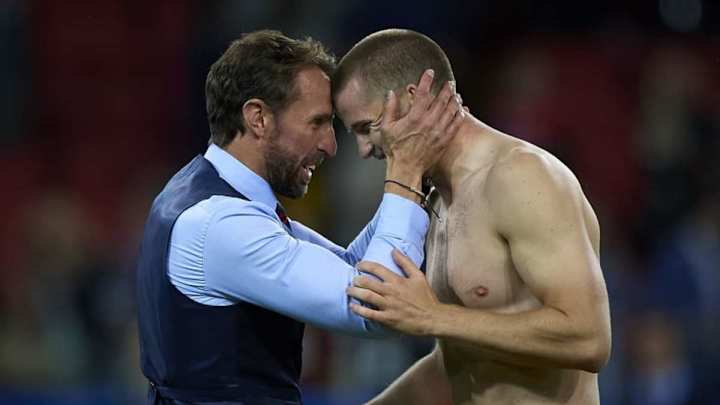90min World Cup Fan Diaries: How a Subtle Change Could Turn England From Dreamers to Conquerors

After some of the mainstream media’s simply disgusting bashing of Raheem Sterling ahead of the World Cup, most England fans, as well a significant selection of respected journalists were desperate to see the Manchester City man hit his peak in Russia.
After yet another strong campaign at the Etihad Stadium, in which the Premier League and EFL Cup-winner netted 24 times and provided 13 assists across all competitions, heading into this summer’s tournament, there was a true sense of optimism that this could be the time the 23-year-old truly arrives on the international stage.
Maybe didn't come across on TV cameras but Sterling made so many runs last night that deserved more but never got the pass. England were conservative in possession and took few risks (as they've been coached) but RS looked more like making things happen off-ball than anyone else
— Ed Malyon (@eaamalyon) July 4, 2018
For several years, when the usually so dynamic and creative attacker pulled on the Three Lions colours, a spark seemingly dwindled. As if the weight of representing England was too much, or experiences of old were too difficult to overcome.
And despite having the will of a nation behind him, again, this World Cup has seemingly, so far, passed Sterling by. Unlike his weekly showings on the domestic scene, there is a lack of incisiveness; an absence of fearlessness which makes him such an imperative asset to Pep Guardiola.
Gareth Southgate has persisted in playing the City ace alongside Harry Kane in the forward line, with the former Liverpool academy graduate switching between a supporting role and attempting to find space in behind. However, as of yet, including in England’s nail-biting victory over Colombia on Tuesday, Sterling has struggled to shine at either.
Yerry Mina won't get off Raheem Sterling's back - a job at the Daily Mail awaits pic.twitter.com/4LSHQLYN4K
— JOE (@JOE_co_uk) July 3, 2018
Whether the quality of service should be taken into consideration remains to be seen, with the Three Lions’ lack of creativity in the middle of the park highlighted as a potential weakness ahead of the competition.
But when others such as Jesse Lingard and Jordan Henderson have taken their opportunity in staking their claim as deserved permanent fixtures in the starting XI – much like Dele Alli this summer – Sterling has not, and against a stronger side, his ineffectiveness could turn out to prove costly.
At this point, it would be easy for some to list possible alternatives in style of play or tactics which could make the 23-year-old’s impact more effective, yet, with England’s defensive solidity and balance from their current three-at-the-back philosophy, a more subtle change is needed. And Southgate could already hold the key within his squad.
Get in there!! Great character shown from the lads. We go again. @England 🏴🦁🦁🦁 pic.twitter.com/hG9lzSrD74
— Harry Maguire (@HarryMaguire93) July 3, 2018
Unlike the aforementioned struggles Sterling seemingly has when featuring for England, Marcus Rashford appears to be the polar opposite. The Manchester United forward is by no means the finished article, and, on the past 12 months alone, has deservedly been placed in reserve to both Kane and his fellow Manchester-based net-finder.
Yet, as was evident against Tunisia, and indeed Colombia, with the 20-year-old’s cameo including a few neat passes as well as tucking away his penalty under immense pressure, Rashford offers a little more on the international stage.
Never in doubt bro 🤜🏻🤛🏾 @JPickford1 pic.twitter.com/DJODYreNEX
— Marcus Rashford (@MarcusRashford) July 3, 2018
Much like was expected from Sterling ahead of the World Cup, his direct style of play has proven to be an incredibly difficult skill for the opposition to overcome. However, it is his overall fearlessness with the ball at his feet which has been most impressive.
Arguably, however, Rashford’s showing against Belgium, where neither he or Jamie Vardy offered much going forward, could be used to counteract the call for change. And with England now well immersed into the business end of this summer’s World Cup, altering a winning outfit could come back to haunt Southgate.
What could prove to be more damning is staying loyal to a player who, again, so far, has offered very little in the way of cementing his place in the Three Lions’ XI. In truth, despite the above, it is quite difficult to be overly critical of England at this present moment.
A quarter final is on the cards with Sweden and the penalty hoodoo is over. Nevertheless, if Saturday in Samara proves to be the county’s swansong at the 2018 World Cup, it could turn out to be yet another ‘what if?’ campaign – and that is not what this selection of players deserves.
